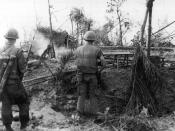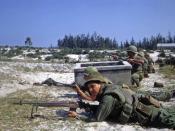"The Tet Offensive was a significant turning point in the Vietnam War" How far do you agree with this view?
1,200-500 WORDS
Introduction
Definition. The Tet Offensive was a surprise attack by the North Vietnamese and the Viet Cong on the Americans. The Americans prevailed, however the public was deeply affected by this event.
Two sides to the debate
Answer the question - which side is stronger?
Paragraph One
Public support for the Vietnam War dramatically dropped after the Tet Offensive, largely due to negative media 39% -> 26% approved of Johnsons handling of Vietnam
48% -> 36% approved of Johnsons handling as a president Poll Evidence
Hawks began to change their views
Walter Cronkite said "to say that we are closer to victory today is to believe, in the face of the evidence, the optimists who have been wrong in the past. It is increasingly clear to this reporter that the only rational way out then will be to negotiate, not as victors, but as honourable people who lived to their pledge to defend democracy, and did the best they could".
In response to Walter Cronkite's change in attitude President Johnson stated 'If I've lost Cronkite, I've lost America'. (How far do I agree with this point?).
Walter Cronkite was an extremely influential and famous news presenter. His words affected most of America, and many Americans admitted to psychological defeat of Vietnam. (Tet may have been a military victory, however due to the media's portrayal of the occurrence it proved to be a psychological defeat). Tet opened the American's eyes to the real horrors of the war and they were terrified by what they saw. It therefore caused increased numbers of people to put pressure on the government to withdraw from Vietnam, and restore peace in America.
The Mai-Lai massacre took place in response to Tet (also caused public support to drop)
Many pictures of the massacre were shown to Americans, who were horrified by what was really happening in Vietnam and they couldn't believe that their revered General had performed this crime. No American had been shot at during the massacre.
The Mai-Lai massacre was a turning point in itself, however without the Tet Offensive having taken place this massacre may have not occurred. The Americans became more strategic in their rooting out of the Viet Cong after the Tet Offensive, and regularly went on 'search and destroy' missions. This was a 'search and destroy' mission; however this was clearly an excuse for Americans to kill a large amount of people, as no Americans were shot at during the procedure. This caused public support to drop even further.
Nixon was elected and began the process of 'Vietnamisation' (withdrawal of US troops).
Up until 1968 the number of US troops in Vietnam escalated to 520,000.
After 1968 troops de-escalated until they reached 200,000 in 1970.
US tactics changed (strategic bombing)
The Tet Offensive clearly kick started the process of withdrawal of US troops, as public support for the war had dropped so dramatically and Americans were eager to remove troops from Vietnam.
However, there are limits to how far the Tet offensive was a significant turning point in the Vietnam Warâ¦
The Viet Cong wanted to seize the cities and expel the Americans however they did not succeed. The media however didn't broadcast the fact that the Americans had won the battle, they only showed negative media.
As media coverage increased more Americans were able to see the horrors of the war, but what they were exposed to had been taking place long before, however they had been unaware of it.
Only 37% of America's population supported the Vietnam War before the Tet Offensive (1957)..
The Viet Cong were better at winning the hearts and minds of the Vietnamese people.
Gary Wieland, a soldier said that he thinks 'the number of deaths and injuries' was the reason Americans began to stop supporting the war,
Media coverage meant that public support dropped even without the Tet Offensive - it wasn't a turning point as support was dwindling and people were already putting large amounts of pressure on the government to withdraw from Vietnam. The Vietnamese people also disliked the Americans as they had bombed many of their villages with Agent Orange, and destroyed their livelihood, families and homes. The Tet Offensive therefore did not affect their resolves; the Americans were already being rejected.
The war in Vietnam continued for a further seven years, five of which the Americans were involved in.
The escalation of troops in Vietnam had already begun to decrease after the Tet Offensive.
The government had obviously begun to slowly withdraw from Vietnam as they saw that public opinion was against remaining in the war. 37% of the population supported the war before Tet, therefore where is the evidence that says that Tet kick started the withdrawal of Vietnamese troops? This was already taking place before.
Conclusion
The case for both sides; which side do you agree with more and why?
Public support was the main reason for the withdrawal of American support in Vietnam.
It was a turning point to a certain extent, however evidence has shown that public support was already extremely low, and in a decline.


